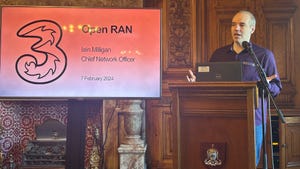Vitesse Execs Get the Axe
CEO and two others are terminated, and Vitesse announces new problems with financing and a lower figure for its cash reserves

Vitesse Semiconductor Corp. (Nasdaq: VTSS) stock fell more than 20 percent this morning as the company fired its CEO and other executives and noted that its cash holdings are about half what was announced earlier this year.
Louis Tomasetta was fired, as were chief financial officer Yatin Mody and Eugene F. Hovanec, executive vice president and former CFO.
Acting CEO Chris Gardner -- previously Vitesse's chief operating officer -- was formally named the chief executive this morning. Likewise, acting CFO Shawn Hassel will move into that spot for good. Hasell comes from the financial consulting firm of Alvarez & Marsal LLC, which Vitesse has engaged for help.
Vitesse stock was down 40 cents (21.6%) at $1.45 in midday trading.
The executive overhaul comes as part of an ongoing -- and worsening -- set of scandals that began April 18, when Vitesse announced it was investigating stock-option grants for certain executives. (See Vitesse Brass Placed on Leave and Vitesse Woes Worsen.)
The executive overhaul was expected. What probably sank the stock today were new and not so cheery disclosures about Vitesse's finances.
The biggest problem is a new picture of Vitesse's cash situation. Today's release notes Vitesse's unrestricted cash and equivalents total $13.2 million. But its latest Securities and Exchange Commission (SEC) 10-Q filing, for the quarter ended Dec. 31, 2005, listed $27.4 million in cash and equivalents and another $1.7 million in short-term investments.
Separately, Vitesse said Silicon Valley Bank has declared the company in default on its credit facility, citing factors including Vitesse's tardiness with its March-quarter earnings report. Vitesse has drawn $10 million on that credit "plus approximately $4.2 million in issued but undrawn standby letter of credits," Vitesse's release notes.
Vitesse is scrambling to patch up the Silicon Valley Bank situation and says it's reached a "conceptual agreement" with the bank that could include an immediate $5 million payment plus some additional financing. Vitesse says it's also hired an investment bank to help seek financing.
Still, Vitesse's release includes a dire warning: "If additional financing is not obtained and/or the Bank takes further action under the credit facility, it would have a material adverse effect on the Company's operations, liquidity and financial condition."
Vitesse announced that its internal investigation -- which had already expanded to include customer credits -- now includes the company's revenue recognition practices in general as well as its methods for reporting cash in its quarterly earnings.
Before all these problems arose, Vitesse's stock had been on a rally, climbing as high as $3.79 in late March. The stock hadn't been at that level since late 2004.
Vitesse's initial investigation apparently was precipitated by a Wall Street Journal article about the suspicious timing of executive stock options.
— Craig Matsumoto, Senior Editor, Light Reading
About the Author(s)
You May Also Like












